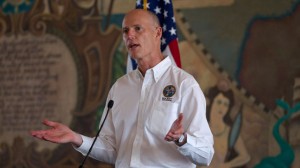On Thursday, I wrote about the growing controversy surrounding Florida Governor Rick Scott’s recent efforts to purge “ineligible citizens” from that state’s voter rolls. Thursday afternoon, a federal judge blocked much of the 2011 law that required groups registering new voters to submit completed forms within a 48-hour period, or face fines. Groups like the League of Women Voters had stopped holding registration drives in Florida because of the new regulations. The judge wrote that the deadline was “harsh and impractical” and “unconstitutional.”
Think Progress reports that “though state judges and the Department of Justice have already taken steps to prevent voter disenfranchisement, Hinkle’s decision is the first time a federal court has blocked one of the most recent round of state voter suppression laws.”
“Voters have already begun to experience the effects of new anti-voting laws. Minority voter registration is down significantly from the 2008 election. Among Latinos nationwide, voter registration has dropped five percent; for blacks, registration rates are down seven percent.”
All told, in the past year the Florida legislature has made 80 changes to state election laws. Three of those changes have been challenged by the U.S. Department of Justice as discriminatory under the Voting Rights Act.”
The third challenge took place Thursday night. The DOJ sent Florida Secretary of State Kent Dentzler a letter demanding that the state stop purging its voter rolls until the process is reviewed for possible Voting Rights Act violations.
And while it’s always a good idea to keep an eye on Florida, keep in mind that it’s not the only state to tighten restrictions on voting in the past year. Frontline producer Sarah Childress wrote recently about the “‘unprecedented’ number of restrictive laws being passed across the country.”
Nearly every state — 41 so far — has introduced some kind of restrictive voting legislation since the beginning of last year, and 18 have succeeded in passing laws, some of which could have a direct impact on the 2012 election, according to a recent analysis from the nonpartisan Brennan Center for Justice at New York University’s School of Law.
In an editorial, The New York Times called out Colorado and New Mexico, two “swing states with large Hispanic populations” running their own voter roll purge programs. According to the Times, New Mexico’s investigation of 64,000 “suspicious” voter registrations found only 19 cases of voters who may have been noncitizens.


